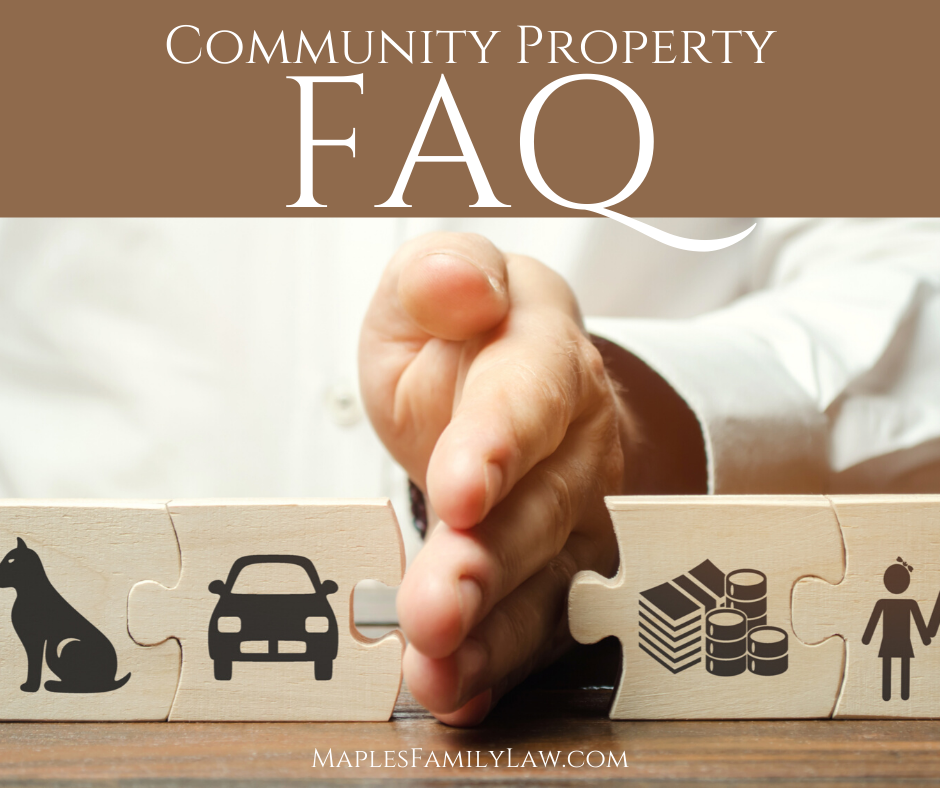
Community Property FAQ: Answers to Common Community Property Questions
If you’re like many people, you know California is a community property state – but what does that mean when you’re getting a divorce? Here’s what you need to know.
Community Property FAQ: Answers to Common Community Property Questions
Here you’ll find answers to our most common questions about community property questions, which might help you with your case. If you have more questions, or if you don’t see the answer you need here, feel free to call us at 209-395-1605.
What is an Example of Community Property?
Any property that you and your soon-to-be ex-spouse acquired during your marriage is considered community property in California. Some of the most common examples of community property include:
- Vehicles
- Wages earned
- Home and furnishings
- Personal belongings
- Cookware
- Art
- Computers and other electronics
Related: Is California a community property state?
What is the Difference Between Community Property and Joint Tenancy?
Joint tenancy is a type of co-ownership that allows a property owner to keep property in the event that the other property owner dies. Joint tenancy is different from community property – but most married couples hold property as joint tenants with the right of survivorship. The biggest thing to be concerned about? Tax consequences. There might be capital gains issues that you need to know about, so talk to a tax consultant if this applies to your situation.
Related: What is community property in California?
Can Community Property Become Separate Property?
It’s not uncommon for separate property to become partly community property (such as when one person has a house before the marriage but continues paying on it during the marriage). This is called transmutation. If it went the other way, it would also be called transmutation. The only way community property could become separate property is if there was a mistake in classifying the property to begin with. Separate property includes only the property one spouse obtained before a marriage, after separating, and property received as a gift or inheritance during the marriage.
Related: Hiding assets during divorce
What Are Community Property Debts?
When you acquire assets or debts during your marriage, they’re community property. That means you and your soon-to-be ex-spouse own them equally. Even if only one spouse signed up for the debt, it belongs to both of you. You’re both legally responsible for the debt, but you can negotiate with your spouse over debts during the divorce. If you have marital debt, talk to your Stockton divorce attorney about what to do next.
Related: How is credit card debt split in a California divorce?
Can My Husband Take My Car if It’s In My Name?
If you brought a vehicle into your marriage and it was paid for before the wedding, it’s your car – your husband can’t take it. However, if you bought the vehicle (or even continued paying on it) during your marriage, your husband has the same right to the car that you do. Likewise, if he gave you the car as a gift, it’s separate property. You may be able to negotiate with your husband, or you might be able to get the court to issue an order that says you’re entitled to continue using the car during (and possibly after) the divorce. You should talk to your attorney if you’re concerned that your husband will take your car when it’s in your name.
Related: Community property basics in California
How Much is My Wife Entitled to In Divorce?
In California, which is a community property state, both parties to a divorce are entitled to a fair and equitable distribution of their marital assets. One spouse might also be entitled to spousal maintenance (commonly called alimony), depending on that spouse’s ability to provide for him- or herself. All marital assets – and marital debts – are divisible in divorce. However, if you came into the marriage with property you owned, that remains separate and your wife is not entitled to it in the divorce.
Related: Who gets the house in a California divorce?
Are Wages Considered Community Property?
Wages are considered community property in a divorce in California, provided that you earned them during your marriage. However, the wages you earned the week – or even the day – before you physically got married are separate property and your spouse isn’t entitled to a fair and equitable distribution of them. It’s worth noting, too, that community income isn’t only about money. It can include real estate, payments you receive for services, or payments you receive in rents, as well as other forms of income.
Related: Bitcoin and divorce
What is Community Property in Real Estate?
In real estate, community property is typically a home or piece of property that a couple purchased during a marriage. This real estate is divisible in a divorce. Sometimes a house or piece of property is separate (meaning that it belongs to just one spouse), such as when that spouse bought and paid for it prior to the marriage. However, everything the couple purchased or acquired during the marriage is community property – including real estate.
Is Cash Considered Community Property?
Cash holdings, such as paper money, savings accounts, checking accounts and investment accounts, are considered community property if the money was acquired during the marriage. For example, if you opened a checking account (even if it was just in your name) during your marriage and put in money that you acquired during the marriage, that money is community property. As community property, it’s divisible during divorce.
How Are Assets Divided in a Community Property State?
In a community property state, assets are divided fairly and equitably. That doesn’t necessarily mean 50-50, though. When it comes to how assets are divided in a community property state like California, each spouse is entitled to a fair share of everything. That means you’re free to negotiate if you’d like. You might trade two antique vehicles for an empty piece of property in the country, for example, or you might agree that your spouse will pay off your joint marital debt while you get to keep the paid-off house. As long as your agreement is fair to both of you, the judge assigned to your case is likely to sign off on it.
Is an Inheritance Considered Community Property in a Divorce?
In California, an inheritance is not considered community property in a divorce unless it was left to you and your spouse. If it was left to only one of you, it belongs solely to that person – it’s separate property.
Do You Need to Talk to a Lawyer About Community Property?
If you still have questions about community property in California, or if you need to talk to an attorney about dividing your property in a divorce, we’re here to help. Call us at 209-395-1605 to let us know what’s going on – we’ll be happy to schedule a consultation where you can talk to an attorney and get the answers you need.













